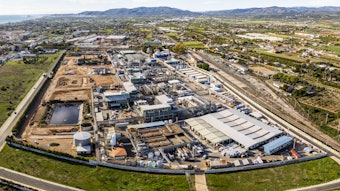
There is growing interest among the 119th Congress in proposing changes to the Toxic Substances Control Act (TSCA). We at the American Cleaning Institute are happy to see this topic on the docket, knowing that targeted changes to TSCA could have huge implications and drastically improve the production and approval of new chemistries for not only our members, but fragrance formulators and ingredient manufacturers across the industry.
This article is only available to registered users.
Log In to View the Full Article
There is growing interest among the 119th Congress in proposing changes to the Toxic Substances Control Act (TSCA). We at the American Cleaning Institute are happy to see this topic on the docket, knowing that targeted changes to TSCA could have huge implications and drastically improve the production and approval of new chemistries for not only our members, but fragrance formulators and ingredient manufacturers across the industry.
With proposed changes in the works, it’s important to understand the full context of how we got to where we are today.  Blake Nanney, director, government affairs, American Cleaning InstituteCourtesy of American Cleaning Institute
Blake Nanney, director, government affairs, American Cleaning InstituteCourtesy of American Cleaning Institute
TSCA defines how new and existing chemicals are regulated by the United States. The Environmental Protection Agency (EPA) has jurisdiction over implementing the TSCA law by overseeing the chemical management process for both new and existing chemicals. For example, if fragrance and ingredient manufacturers seek to introduce new chemistries to the U.S. marketplace, they must submit a Pre-Manufacture Notice (PMN) to the EPA. The EPA must then conduct a review to determine if the manufacturer can use the new chemistry in products for U.S. consumers.
According to the TSCA statute, which was amended by the Frank L. Lautenberg Chemical Safety Act for the 21st Century Act and signed into law by President Barack Obama in 2016, EPA must review and decide on a PMN submission within 90 to 180 days. And while the bill was successfully signed into law with bipartisan support, the implementation has encountered challenges. Manufacturers, including those in the fragrance and ingredient manufacturing space, have experienced significant delays in EPA’s ability to process PMN reviews within the statutory timeline, leading to a backlog of pending new chemical reviews.
The result is a bottleneck in innovation for new chemistries. This hinders advancements in public safety and environmental protection for new chemistry innovations that could replace existing chemicals by using improved manufacturing and processing techniques that reduce risk, exposure and energy use. In some past cases, the EPA has imposed overly conservative assumptions and data requirements that actively hamper the speed at which industry can release new safe and innovative products.
Additionally, many new chemical PMN determinations have been regulated via Significant New Use Rules (SNURs), which often prohibit usage by downstream manufacturers with complex supply chains. This particularly hurts cleaning product manufacturers, as they are often prohibited from utilizing new chemistries in their products that could otherwise replace older, legacy chemicals.
On the upside, earlier this year, EPA leadership announced that it would prioritize resources to address the backlog of new chemical reviews – a positive development that ACI supports. We commend the EPA for prioritizing new chemicals. However, more is needed on the legislative side to result in positive changes that will last into the future.
That brings us back to the recent push in both the House Energy & Commerce Committee and the Senate Environment and Public Works Committee, which have voiced interest in the problems identified with the TSCA statute and the law’s implementation. We were happy to see the House Energy and Commerce Committee begin this legislative session with the Committee’s first hearing of the year focused on the issue, which followed an oversight hearing in January 2024 by the Senate Environment and Public Works Committee.
As Congress considers ways to improve TSCA, ACI is advocating for a targeted legislative amendment that improves the EPA’s ability to process PMN reviews consistently and predictably. This would improve ingredient suppliers and fragrance formulators’ ability to innovate and introduce new chemistries and products to American consumers. It will help keep the American market competitive, especially because many other countries have had chemistries reviewed and approved for market entry for specific new chemicals, while they haven’t within the U.S., resulting in fewer choices and benefits for our domestic consumers.
 ACI supports a risk-based regulatory approach to TSCA modernization that is practical, timely and firmly grounded in sound science.Drobot Dean at Adobe Stock
ACI supports a risk-based regulatory approach to TSCA modernization that is practical, timely and firmly grounded in sound science.Drobot Dean at Adobe Stock
We also view this challenge as a detriment to investments in U.S.-based research and development. As we all know, businesses like predictability. And when other chemical management programs around the world are more efficient and consistent in their reviews – where a manufacturer can predictably expect a determination in a reasonable timeframe – that weighs on corporate decision makers when they think about where to invest research and development funding for new chemical advancements. Since we haven’t had a working new chemicals program in the U.S. for some years now, businesses have taken notice.
That’s why ACI supports a risk-based regulatory approach to TSCA modernization that is practical, timely and firmly grounded in sound science. This approach ensures that member companies and those across the industry spectrum can innovate and formulate.
ACI will continue to advocate for the changes necessary to improve the chemical management process managed by the EPA. We are not calling for a wholesale rewrite of the TSCA statute; we support targeted, meaningful changes that can truly deliver more innovation on the scale Americans expect and deserve. We’ve made this case directly to Congress in recent years; through countless individual meetings on Capitol Hill, as well as multiple Capitol Hill fly-ins, facilitating direct engagement so our member companies can speak directly with legislators about issues impacting their organizations. We recently partnered with the members and staff from the Congressional Chemistry Caucus to host a reception focused on Innovative Chemistries for a Cleaner America, highlighting the importance of chemicals across the economy.
We’re committed to this. And as negotiations continue among the members of both the House and Senate, we will continue to press Congress to make the necessary changes to instill more predictability and efficiency in the TSCA chemical management process. ACI continues to be a leader on this issue, as we know innovation is critical for industry growth, economic competitiveness, and better choices for American consumers and families.










